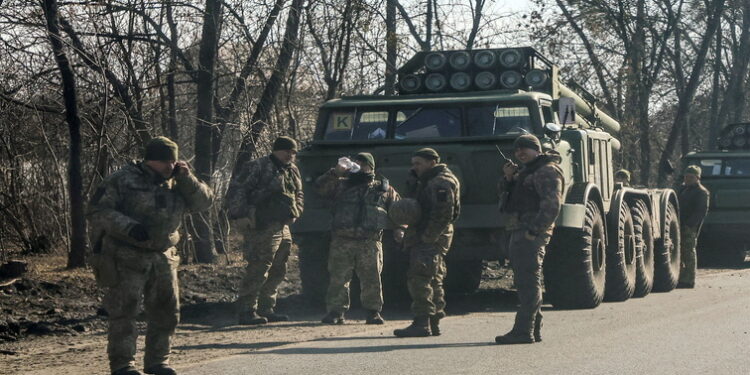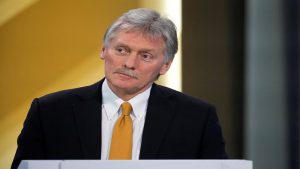Ukraine and Russia: What you need to know right now
South Africa says it remains deeply concerned by the escalating conflict in Ukraine and welcomed the commencement of talks with Russia. That was the message delivered by the country’s Ambassador Mathu Joyini to the Emergency Special Session of the U.N. General Assembly in New York.
Joyini warned that at a time when the world was struggling to emerge from the effects of the COVID-19 pandemic, this conflict would further delay the world’s recovery.
Joyini failed to echo an earlier statement from the Department of International Relations calling on Russia to immediately withdraw its forces from Ukraine in line with the United Nations Charter. She urged a diplomatic solution that addressed the security concerns of all parties.
VIDEO: Mathu Joyini addresses Day 2 of UN General Assembly Emergency Special Session
Johnson and Stoltenberg reinforce NATO’s defensive position against Russia
NATO’s chief, Britain’s Prime Minister and his Estonian counterpart held a joint news conference on Tuesday (March 1) at an army base in Estonia, as Russia warned Kyiv residents to flee their homes and rained rockets down on Kharkiv.
“I want to be crystal clear finally, on that point, we will not fight Russian forces in Ukraine and our reinforcements like these reinforcements here in Tapa are firmly within the borders of NATO members and they are profoundly the right thing to do,” he added.
NATO Chief Jens Stoltenberg reinforced that NATO is a ”defensive alliance.”
“Our message to President Putin is: stop the war. Pull out all your forces from Ukraine and engage in good faith in diplomatic efforts,” he said.
Meanwhile, Estonian Prime Minister Kaja Kallas said NATO must improve its defences of the Baltic nations, the most vulnerable part of the military alliance.
“This includes, on land, establishing a permanent, increased forward presence. In air, establishing a credible defence posture. And a sense of urgency in developing NATO’s upgraded defence plan,” she said.
Ukraine says five people killed in Russian attack on Kyiv TV tower
An attack by Russian forces on a television tower in Kyiv killed five people, the Ukrainian emergency services said on Tuesday in a statement on television. Earlier on Tuesday, missiles struck the heart of the eastern city of Kharkiv.
Ukrainian President Volodymyr Zelenskiy said on Tuesday Russia must stop bombing Ukrainian cities before meaningful talks on a ceasefire could start, as a first round of negotiations this week had yielded scant progress.
Ukraine’s Kharkiv struck by cluster bombs, experts say
Multiple cluster bombs were fired on Ukraine’s second largest city Kharkiv on Monday, two munitions experts said after reviewing footage posted on social media. Kharkiv has been the target of some of the worst aerial attacks since Ukraine was invaded by Russian forces on February 24.
“Kharkiv appears to have been the target of multiple cluster munition attacks yesterday,” said Sam Dubberley, head of the Digital Investigations Lab at New York-based Human Rights Watch.
“We have geo-located one showing what appears to be several civilian victims a short way away.” Hamish de Bretton-Gordon, a former British Army officer and biological and chemical weapons specialist, agreed that cluster munitions were most likely used in Kharkiv.
“This does look very much like cluster bombs, and similar to those I’ve seen going off in Iraq and Syria,” he said. “The multiple explosions on impact of each war head would suggest a cluster munition.”
Ukraine’s ambassador to the United States accused Russia on Monday of attacking Ukrainians with cluster bombs and vacuum bombs, weapons that have been condemned by a variety of international organizations. When asked about allegations that Russia was using cluster munitions and vacuum bombs, Kremlin spokesperson Dmitry Peskov said: “It’s undoubtedly fake news.” Russian operations are focused on military targets, not civilian ones, he said.
European Union talks to U.S. about widening airspace ban on Russia
The European Union is speaking to U.S. counterparts about extending a ban on Russian flights, it said on Tuesday, as it gave more details of the EU’s closure of airspace to Russian aircraft imposed after Moscow’s invasion of Ukraine. Airlines already face potentially lengthy blockages of key east-west flight corridors after the EU and Moscow issued tit-for-tat airspace bans. Washington has not ruled out similar action. A senior EU official, when asked if they were talking to the United States about it following the European ban, said:
“Yes, there are discussions with the U.S. on what measures they will adopt.” The EU official said Russian oligarchs, even those with dual nationalities, would not be able to get around the EU airspace ban. “It doesn’t matter whether they are EU residents, if they are Russian nationals, they will be covered,” the official said. “Russian nationals or a Russian company cannot charter, own or control a plane that will be flying into the EU, out of the EU or overflying the EU. So that’s the rule.”
VIDEO: Russia-Ukraine – EU assists Ukraine, ramps up sanctions on Russia
U.S. says expels Russian spy working for United Nations
The United States is expelling a Russia “intelligence operative” who works at the United Nations, said a spokesperson for the U.S. Mission to United Nations on Tuesday.
“On February 28, the United States also initiated the process to require the departure of one Russian intelligence operative working at the United Nations who allegedly abused their privileges of residence in the United States,” the spokesperson said. The expulsion of the Russian working for the United Nations is in addition to the 12 Russian U.N. diplomats whom Washington has also ordered to leave the country over national security concerns.
Russia to retaliate for U.S. expulsion of 12 diplomats at U.N.
Russia said on Tuesday it would retaliate over the U.S. expulsion of 12 of its diplomats at the United Nations for alleged spying. Foreign Ministry spokeswoman Maria Zakharova said the U.S. action “will not remain without a proper reaction and an answer – not necessarily .” The United States said on Monday the expelled diplomats were”intelligence operatives” who had been “engaging in espionage activities that are adverse to national security.”
Iran’s supreme leader criticises U.S. over Ukraine crisis
Iran’s Supreme Leader Ayatollah Ali Khamenei said on Tuesday the war in Ukraine should be stopped and accused the “mafia-like regime” of the United States of creating the conflict. Russia, whose troops invaded Ukraine last week, is a strategic partner for Iran, which has been under Western sanctions for years. While Tehran and Washington have been foes for decades, Iran and Russia have deepened trade ties and have been allies in the Syrian conflict. “The U.S. regime creates crises, lives off of crises and feeds on various crises in the world. Ukraine is another victim of this policy,” Khamenei said in a televised speech.
U.S. to release 30 mln barrels of oil, aims to end ‘weaponization’ of Russian oil
The United States vowed on Tuesday to release 30 million barrels of oil as part of a global 60 million barrel pledge in an effort to shore up energy markets amid the ongoing Russia invasion of Ukraine, and said it could take further steps as needed. “We are prepared to use every tool available to us to limit disruption to global energy supply as a result of (Russian) President (Vladimir) Putin’s actions,”
White House spokeswoman Jen Psaki said in a statement. “We will also continue our efforts to accelerate diversification of energy supplies away from Russia and to secure the world from Moscow’s weaponization of oil and gas,” the statement added.
The United States and 30 member countries of the International Energy Agency agreed to release 60 million barrels of oil from their strategic reserves to stabilize global energy markets, the U.S. Department of Energy said in a separate statement. “We stand prepared to take additional measures if conditions warrant,” U.S. Energy Secretary Jennifer Granholm said.
Oil prices surge 9% as global crude reserve release disappoints
Oil prices surged 9% on Tuesday, as a global agreement to release crude reserves failed to calm fears about supply disruptions from Russia’s invasion of Ukraine, and instead underscored concerns about growing disruptions. Members of the International Energy Agency (IEA), which include the United States and Japan, agreed to release 60 million barrels of crude from their reserves to try to quell the sharp increase in prices that has pushed major benchmarks past $100 a barrel. However, the news of that release – equivalent to less than one day of worldwide oil consumption – only underscored the market’s fear that supply will be inadequate to cover growing disruptions to the crude market. Brent futures rose $8.80, or 9%, to $106.77 a barrel by 11:43 a.m. EST (1643 GMT), heading for their biggest daily percentage gain since March 2021.






